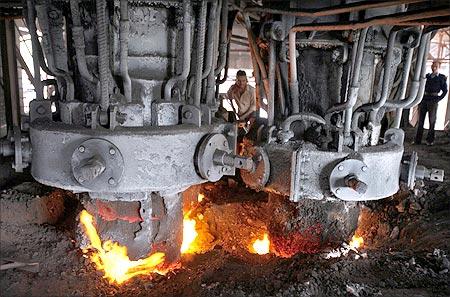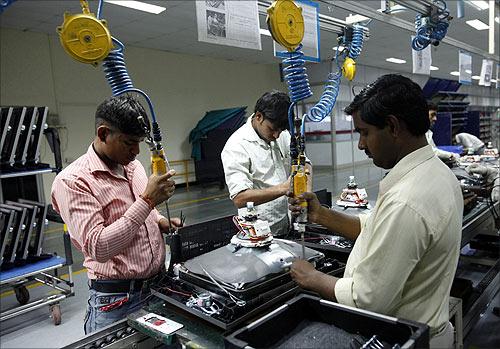Photographs: Sherwin Crasto/Reuters Shyamal Majumdar in Mumbai
When top executives of TeamLease, India's largest staffing solutions company, walked into the office of the Mangalore Employment Exchange in 2010, what they saw was almost surreal.
The 'document room' -- where applications of job aspirants were kept -- had rows of shelves, but the files were missing.
A closer scrutiny revealed that the files were there, but invisible.
They were buried under mountains of dust.
It was obvious the room hadn't been cleaned for months.
. . .
How to make job exchanges work
Image: An employee works inside a steel factory on the outskirts of Jammu.Photographs: Mukesh Gupta/Reuters
And, the files containing aspirations of millions of job-seekers had been touched, perhaps only by rodents.
The application forms had space for every irrelevant detail, but none for a job applicant's telephone number or email address.
This meant the only way to contact the candidate was through letters.
Also, jobs were given on a first-come-first-served basis; so, letters would be sent to candidates who had applied, may be, 10 years ago, and have either moved on in life, or have changed their postal addresses or have simply become ineligible for the job on offer.
Naturally, the strike rate was abysmal.
. . .
How to make job exchanges work
The Mangalore exchange, for example, had given out 75 jobs in three years.
Most of these jobs were in the government or quasi-government sectors.
Private companies, where most new jobs are, never used the exchanges for potential employees.
On top of that, there was no compulsion for the public sector to come, following a Supreme Court judgment in 1996 noted that appointments no longer had to be from the pool that was registered with employment exchanges -- as long as job vacancies were suitably publicised.
The Directorate General of Employment and Training's website says, "Therefore, employment exchanges are left with only stray cases, that too at lower levels of employment.
. . .
How to make job exchanges work
Image: Workers at LG Electronics India Pvt Ltd. assemble television sets inside a factory at Greater Noida.Photographs: B Mathur/Reuters
"On the placement side (regular wage employment), the role of employment exchanges is definitely going to be not very significant".
But employment exchanges continue in their present form, despite the expenditure on infrastructure, employees and maintenance.
In fact, it costs the state government (and, therefore citizens) over Rs 200,000 for a single placement, back-of-the-envelope calculations show.
Mangalore was still better off.
Many other employment exchanges have not provided a single job in the last four or five years, which is not a surprise considering the gates of some of the exchanges didn't open for days simply because the persons who had the keys were on leave.
. . .
How to make job exchanges work
Photographs: Reuters
The inspection by TeamLease happened after it entered into an agreement with the Karnataka government to operate the exchange.
Since then, the firm has taken over the management of five other employment exchanges in the state, and is also in the process of taking over the management of the Jhajjar exchange in Haryana.
Besides, talks are on with the Goa, Andhra Pradesh, Odisha and Rajasthan governments, though the process of negotiations have been slow, reflecting the general sluggish decision-making in governments.
. . .
How to make job exchanges work
Photographs: Larry Downing/Reuters
For TeamLease, the exercise is revenue-neutral as the state governments take care of the actual variable cost of operations.
Where the firm benefits is the reach, the existing infrastructure and the access to a ready-made database of job-seekers.
For the state governments, there is no additional cost.
In fact, the cost has gone down significantly because of the operational efficiencies that TeamLease has brought in.
Here is an example of this efficiency: The Mangalore exchange placed 500 jobs in the first month of taking over (against a total 75 in the past three years).
TeamLease Managing Director Ashok Reddy says number has stabilised at 200 jobs a month.
. . .
How to make job exchanges work
Photographs: Yuriko Nakao/Reuters
In the other five, TeamLease is doing 150-200 jobs per month per centre.
This average itself is a huge improvement over the abysmal track record of India's 968 employment exchanges that have almost 45 million people registered with them and have so far placed a shade over 200,000.
What TeamLease has done is no rocket science.
It had realised soon enough that employment exchanges have to go beyond a registration centre and need to be equipped to provide assessment, counselling, training and employment. Just being a repository of candidate data and job openings won't do.
There has to be a system of matching supply with demand -- just the things even a basic private placement agency does.
. . .
How to make job exchanges work
Photographs: Kevin Lamarque/Reuters
So, while earlier a candidate would submit his application form and then wait for the exchange to get back, today a candidate's skills are being matched with the available job profiles; he is counselled on what skills he needs to get a particular job that is availab#8804 and he is given training as well (at a price).
The rigour is important owing to the umemployability factor – a big deterrent for companies to come to the employment exchanges. TeamLease realised this from its own experience.
It hires a person every five minutes, but has been able to recruit only five per cent of the youth who approached it.
The benefits of a private-public partnership model are, thus, obvious. It's a pity more state governments are not still warming up to the idea.









article